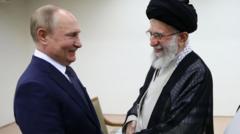-
- Today authorities inaugurated the Second Session of the Regional Conference on South-South Cooperation.
SANTIAGO, Chile – International cooperation is a tool for solidarity, but it is also a structural necessity for building a more productive, inclusive, sustainable, just and resilient future in Latin America and the Caribbean, according to the authorities participating today in the Second Session of the Regional Conference on South-South Cooperation in Latin America and the Caribbean, which is taking place through Wednesday, June 18 at the main headquarters of the Economic Commission for Latin America and the Caribbean (ECLAC) in Santiago, Chile.
This intergovernmental event – which brings together representatives of the region’s countries, the United Nations system, and regional and international organizations – was inaugurated by José Manuel Salazar-Xirinachs, ECLAC’s Executive Secretary; Dima Al-Khatib, Director of the United Nations Office for South-South Cooperation – UNOSSC (virtually); and Mateo Estremé, Director General of International Cooperation at Argentina’s ministry of foreign affairs, international trade and worship, in that country’s capacity as outgoing chair of the conference. Luis Fidel Yáñez, ECLAC’s secretary of the commission, was also present at the inaugural ceremony.
In his opening remarks, ECLAC’s executive secretary emphasized that the creation of the regional conference on south-south cooperation, during the thirty-sixth session of ECLAC’s committee of the Whole in December 2021, marked a decisive step towards more integrated and effective cooperation in Latin America and the Caribbean.
“This space has strengthened ties between countries from the Global South and has opened new doors to triangular cooperation with extra-regional actors, donors and international organizations,” he affirmed.
José Manuel Salazar-Xirinachs added that the conference’s second session is taking place in a global context marked by multiple crises, significant geopolitical changes and competition between major economies and powers.
“This is a context that I would even describe as a crisis in international cooperation, where certain countries and views are questioning multilateralism, the United Nations system, and international cooperation. That is why we must rethink the role of south-south and triangular cooperation as a critical mechanism for strengthening capacities, mobilizing resources and promoting solutions tailored to regional and national realities,” he stated.
ECLAC’s highest authority stressed that international cooperation is essential for ensuring security, stability and collective well-being in a deeply interconnected world, and he added that at times of crisis, it is not just an ethical option but rather a strategic necessity for surviving and prospering together.
Finally, he emphasized that the current scenario requires courage, creativity, pragmatism, conviction and commitment, along with a long-term vision.
“Global economic and geopolitical conditions could not be more complex, and while there are opportunities, this is an unfriendly time for growth and development efforts. My hope is that this conference can be a game changer: a platform for renewing commitments, building bridges, activating concrete solutions and accelerating fulfillment of the Sustainable Development Goals. The future is not set in stone: it is in our hands, and it starts with what we decide to do together, today, here and now,” he concluded.
Meanwhile, the director of UNOSSC, Dima Al-Khatib, noted that Latin America and the Caribbean has played a unique and very special role in the history and evolution of cooperation for development.
“It was in this region that UN Member States first convened to shape a development cooperation that would transform traditional paradigms, heavier in development assistance and aid, rather than cooperation,” she stated.
Mateo Estremé, director general of international cooperation at the Argentine foreign ministry, affirmed that measuring cooperation among developing countries is key to strengthening their global leadership, improving their effectiveness and moving together towards sustainable development.
He also underlined the relevance of incorporating multi-stakeholder cooperation modalities: “In a context of reduced official resources for international cooperation, it is vital that we design strategies that would allow us to incorporate the participation of the private sector, academia and other actors, and to integrate these sectors in the design and implementation of cooperation activities.”
After the opening ceremony, a panel discussion entitled The challenges of international cooperation in shaping the new regional and global context was held, featuring presentations by José Manuel Salazar-Xirinachs, ECLAC’s executive secretary; Dima Al-Khatib, director of UNOSSC (virtually); Máximo Torero, acting regional representative for Latin America and the Caribbean of the Food and Agriculture Organization of the United Nations (FAO); and Enrique O’Farrill Julien, executive director of the Chilean Agency for International Development Cooperation (AGCID).
On the first day of this meeting, country delegates elected Chile to serve as chair of the regional conference on south-south cooperation for the next two years.
The post International Cooperation essential for building a more productive, inclusive, sustainable, just and resilient future in Latin America – Caribbean appeared first on Caribbean News Global.
